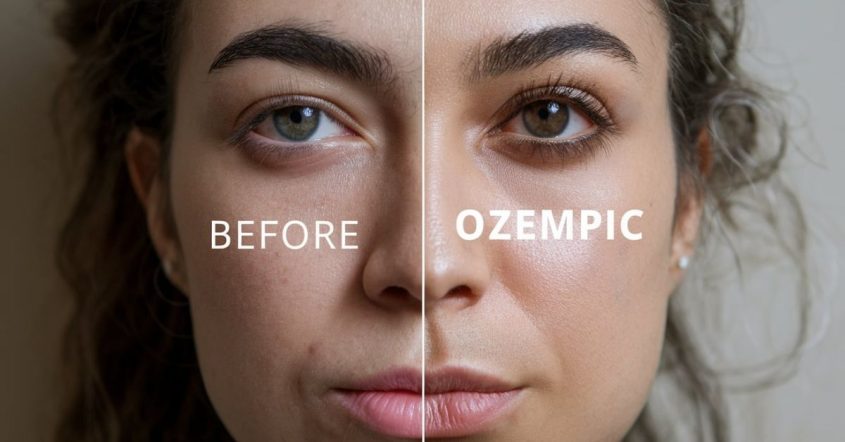The term “Ozempic Face” has become popular recently, especially among people talking about weight loss and the effects of certain medications. It describes the changes in facial appearance, like sagging or a hollow look, that some people experience after losing weight quickly.
Ozempic is a medication originally made to help people with Type 2 diabetes control their blood sugar. However, it is also used for weight loss because it helps reduce appetite and leads to significant fat loss. While this is a positive outcome for many, some people have noticed changes in their face as a side effect.
The media and social platforms are filled with discussions about Ozempic Face, with users sharing their experiences and concerns. Some people worry that their face looks older or thinner than before, even though they are happy with their overall weight loss.
In this article, we’ll explore what causes Ozempic Face, what symptoms to look for, and how to manage or prevent these changes. We’ll also include expert opinions and practical solutions to help you make informed decisions.
What is Ozempic Face?
Ozempic Face is a term used to describe changes in the face that happen when someone loses weight quickly, often while using a medication like Ozempic. These changes can include a thinner or hollowed-out appearance, sagging skin, or wrinkles.
When people lose weight fast, the fat under their skin reduces, including in the face. This fat gives the face a full, youthful look. Losing it quickly can make the skin look loose or make someone appear older. Medications like Ozempic, which help with weight loss by reducing appetite, can speed up this process, making the changes in the face more noticeable.
The Science Behind Ozempic Face
The science behind Ozempic Face is rooted in how the body responds to rapid weight loss, particularly the loss of facial fat. Ozempic, a medication commonly used to manage Type 2 diabetes and promote weight loss, works by reducing appetite and slowing down digestion. This leads to significant weight loss, but it can also cause the body to lose fat from various areas, including the face.
When weight loss occurs rapidly, the face may lose fat more quickly than other parts of the body. Facial fat is important for maintaining a fuller, more youthful appearance. As this fat diminishes, the skin, which is naturally less elastic as people age, may not be able to tighten or adjust quickly enough, leading to sagging or hollow areas, especially around the cheeks, under the eyes, and jawline. The skin’s elasticity plays a crucial role here—younger skin typically bounces back more easily after fat loss, while older skin, which has lost collagen and elasticity over time, may struggle to keep up with the changes.
Hormonal changes triggered by Ozempic also influence how the body loses fat and how the skin reacts. As the body burns fat and loses weight, changes in the levels of hormones like insulin, ghrelin, and leptin impact how fat is distributed throughout the body. This redistribution can result in the face becoming noticeably thinner or more hollow, even if the rest of the body adjusts well to the weight loss. Additionally, weight loss medications like Ozempic may influence other factors, such as hydration and blood flow, which can further affect the appearance of the skin.
In short, the loss of fat in the face due to Ozempic, combined with age-related changes in skin elasticity and the hormonal adjustments from the medication, contribute to the phenomenon of Ozempic Face. These biological factors explain why some individuals may experience noticeable changes in their facial appearance as they lose weight.
How Ozempic Face Impacts People
Ozempic Face can affect people in different ways, both physically and emotionally. Many people notice that their face looks thinner, older, or less vibrant after losing weight quickly. This change can lead to feelings of insecurity, as they might worry about looking unhealthy or older than their age. Socially, these changes can affect confidence, making some people self-conscious in public or in professional settings.
Emotionally, it can be challenging to celebrate weight loss achievements while dealing with unexpected changes in appearance. Some people share stories about feeling conflicted—they are happy to improve their health but feel upset about looking different in ways they didn’t expect.
Experts, like dermatologists and plastic surgeons, explain that these changes happen because of the loss of fat in the face, which can make the skin sag if it doesn’t bounce back quickly. They also note that age plays a role, as older skin is less elastic and may not adjust as well. These impacts highlight the importance of understanding the potential side effects of weight loss and finding ways to balance health benefits with personal concerns about appearance.
How to Prevent or Address Ozempic Face
Preventing or addressing Ozempic Face requires a combination of healthy lifestyle habits, skincare, and, in some cases, cosmetic interventions. A balanced diet rich in skin-nourishing nutrients, such as vitamin C, vitamin E, and omega-3 fatty acids, can help maintain skin elasticity and hydration, while staying properly hydrated supports overall skin health. Gradual weight loss, at a pace of 1-2 pounds per week, can minimize the rapid reduction of facial fat and allow the skin time to adjust, reducing sagging or hollowing. Following a consistent skincare routine that includes hydrating products with hyaluronic acid, collagen-boosting ingredients like retinol or peptides, and daily sunscreen can also improve skin firmness and protect it from further damage.
Engaging in facial exercises, such as puffing out the cheeks or lifting the eyebrows, may help strengthen facial muscles and maintain a youthful appearance. For those experiencing more significant changes, cosmetic procedures like dermal fillers, fat grafting, or non-invasive skin-tightening treatments can restore volume and elasticity. In severe cases, surgical options such as facelifts may be considered. Consulting healthcare professionals is essential; doctors can provide personalized guidance on weight-loss medications and plans, while dermatologists can recommend effective skincare treatments. By combining these approaches, individuals can address Ozempic Face while continuing to enjoy the health benefits of weight loss.
Why Does the Phenomenon Matter?
The phenomenon of Ozempic Face matters because it highlights the complex relationship between health, appearance, and societal expectations. In a world where looking youthful and healthy is often idealized, rapid facial changes from weight loss can create emotional and social challenges, even for those achieving significant health improvements. While Ozempic and similar medications offer life-changing benefits for people struggling with Type 2 diabetes or obesity, the visible effects on the face have sparked widespread concern and discussions, particularly in online communities and media.
This issue also brings attention to societal beauty standards and the pressure to maintain a certain appearance. Many people feel conflicted—celebrating their weight loss and improved health but worrying about looking older or less vibrant. These concerns are not just cosmetic but can impact self-esteem and confidence, especially in social or professional settings.
Additionally, the phenomenon raises awareness about the importance of understanding the broader effects of weight loss medications. It encourages users to take a more informed and balanced approach, considering both health benefits and aesthetic outcomes. This attention to Ozempic Face also emphasizes the role of healthcare and skincare professionals in helping individuals navigate these challenges, promoting a holistic approach to wellness that includes physical health and emotional well-being.
Conclusion
Ozempic Face is a common topic of discussion for people who experience facial changes after rapid weight loss. We’ve learned that these changes happen because of the loss of facial fat, which can make the skin look thinner, saggy, or older. Medications like Ozempic, which are effective for weight loss, can make this effect more noticeable, especially in people who lose weight quickly or are older.
It’s important to see both sides. While Ozempic offers significant health benefits, especially for people managing Type 2 diabetes or obesity, it can bring cosmetic concerns for some. Balancing these benefits with possible side effects is key.
If you’re concerned about how weight loss might affect your appearance, focus on a healthy approach. Gradual weight loss, a nutritious diet, and proper skincare can help minimize these changes. For severe cases, cosmetic treatments might be an option, but always consult professionals before making decisions.
Your health should always come first. Speak to your doctor or a skincare specialist for advice that fits your unique needs and goals.
















